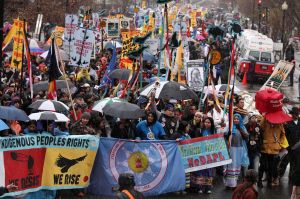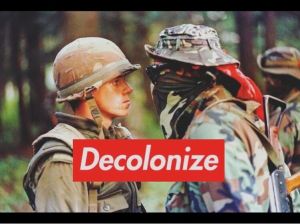Decolonization
Summary
Path to a Decolonial World
See: The Red Deal | Land Back | Food Sovereignty | Climate Reparations | The Red Nation | UNDRIP | Just Transition | Ala Loa
'Decolonization Is Not a Metaphor'
... Tuck and Yang intervened into the way decolonization is taken up within the field of education. They argued that educational projects that use the language of decolonization to describe their social justice endeavors participate in settler moves to innocence. Settler moves to innocence rescue settler futurity instead of fostering actual decolonization, which Tuck and Yang define as the repatriation of Indigenous land and life.
“Decolonization is Not a Metaphor” has become a touchstone for scholars and practitioners of decolonization because it maps the many ways that decolonization is constantly evacuated of its true meaning and intention, which results in the preservation of settler colonialism and consequent deferral of the repatriation of Indigenous land and life. It seems that one of the main contributions of “Decolonization is Not a Metaphor” has been its articulation of what decolonization is not: it is not a metaphor to be taken up within existing settler agendas for liberal, progressive, or radical politics that do not challenge ongoing settler colonialism. If settler-initiated projects do not advance the repatriation of Indigenous life and land, Tuck and Yang remind us, these projects cannot be called decolonial; they are nothing more than settler moves to innocence that keep colonial relations and settler privilege intact.[1]
Land Back
Radical Relationality
What we propose here is thus not a project of self-reflexivity that occurs at the site of individual consciousness raising or healing. Rather, it is a project of inter-reflexivity, a struggle for decolonization premised on the accountabilities we form in lively relation to each other. The act of (re)making our accountability in relationship to water and (re)claiming our relational theories of water culture remind us that we are water based, that we have water memory. As Cutcha notes, in Hoopa, we define ourselves in relationship to water; but more than that, Hoopa understand our place in the world based on how water views the world, or even how water views us. Our directions are views from the river that runs through our valley. “Worldview” is “water view,” a view from the river not a view of the river. We move upriver, or downriver, to the river, or from the river. So our theoretical standpoint is one that foregrounds water view, (re)claiming knowledges not just for the people, but also for the water; not just looking at our relationship to water, but our accountability to water view.[1]
The reclaiming of our accountability to water view has been the hallmark of struggles for decolonization (including research and direct action) in recent years. Our resurgent commitment to water view has reinvigorated our human liveliness and our decolonial conviction. This accountability to water view envisions and enacts an ethos of “living well,” which Harsha Walia (2013) points out defies “the capitalist and colonial system’s logic of competition, commodification, and domination” (p. 255). Living well requires “interdependency and respect among all living things” (Ibid). We call this ethos of living well radical relationality, which is radical in the sense of roots or origins, as in a relationality from which all life and history derives meaning and shape (like water view), and also in the sense of a dramatic and revolutionary change from our current epoch of power, as in a radical shift towards decolonization. We conceive of radical relationality as a term that brings together the multiple strands of materiality, kinship, corporeality, affect, land/body connection, and multidimensional connectivity coming primarily from Indigenous feminists. It provides a vision of relationality and collective political organization that is deeply intersectional and premised on values of interdependency, reciprocity, equality, and responsibility. In ‘Talkin’ Up To The White Woman, Aileen Morton-Robinson (2001) states that “In Indigenous cultural domains relationality means that one experiences the self as part of others and that others are part of the self; this is learnt through reciprocity, obligation, shared experiences, coexistence, cooperation and social memory” (p. 16). Within this framework of relationality, water is not seen as a resource to be weaponized for the interests of capital by corporations that harness, obstruct, pollute, and discipline water through infrastructure projects like dams and pipelines to boost the capitalist economies of settler nation-states. No, within an Indigenous feminist framework, water is a relative with whom we engage in social (and political) relations premised on interdependency and respect.[1]
Liberalism vs Decolonization
Because we have not effectively overthrown settler colonialism, anti-Indian racism remains a fundamental practice in bordertowns and, indeed, everywhere. The decolonization of bordertowns must, therefore, continue to tackle these same issues. This is why we must be wary of certain forms of redress and justice that are recommended under the banner of decolonization. For example, some would have us believe that decolonization is best achieved through healing and reconciliation with everyday purveyors of anti Indianism: settler citizens, business owners, politicians, and police. This is the Trojan Horse version of decolonization that smuggles in everything inherent to colonization, while changing nothing. It relies on the idea that colonization is just a state of mind rather than a violent structure. These advocates argue that if we change the minds and hearts of our oppressors-if we teach cops to be more sensitive about Native culture; if we form Indian commissions to remind politicians that Native people are human beings; if we commit ourselves to nonviolence and peace-then the violence will end. They claim that all we need to do is formulate a shared path, to build bridges toward reconciliation with settlers and live in peaceful coexistence. These are all liberal versions of decolonization that conform with settler colonialism's version of reconciliation. No one is held responsible and the structure remains intact.
The question of responsibility is fundamentally a question of justice. And the question of justice is at the center of decolonization. How can we reconcile with a system that refuses our calls for justice? How can we make peace with a structure that remains hell-bent on our destruction? It is unethical and irresponsible to advance a politics that presumes reconciliation will somehow magically translate into peace for everyone. In a world structured by the elimination of Native peoples, peace- which is the ideal outcome of all forms of justice-can only be achieved through collective struggle to abolish settler colonialism and hold its most pernicious agents responsible. Anything short of this is a form of pacification that places a feel-good salve on colonization without confronting the intractability of the system and its fundamental reliance on anti-Indianism (in other words, violence). Those who advocate for decolonization must not be afraid to engage the material conditions of colonialism and decolonization, however uncomfortable or unsettling this may be to their liberal sensibilities. Liberalism upholds settler colonialism. In its final formulation, it cannot offer any meaningful or transformative forms of justice for the wrongs of colonialism. We are capable of and responsible for defining justice ourselves. This must be the basis of our decolonial praxis.[2]
Era of the Water Protector

See Nick Estes discuss the era of the water protector: https://www.youtube.com/watch?v=ki7OmflLgWg
Decolonizing Fire Science
https://rsv.org.au/events/decolonising-fire-science/
Urgency of Decolonization
Climate Collapse
Resistance to Carbon Projects
A 2021 report published by the Indigenous Environmental Network found that
Total Indigenous resistance against these projects on Turtle Island — including ongoing struggles, victories against projects never completed, and infrastructure unfortunately in current operation — adds up to 1.8 billion metric tons CO2e, or roughly 28 percent the size of 2019 U.S. and Canadian pollution. Victories in infrastructure fights alone represent the carbon equivalent of 12 percent of annual U.S. and Canadian pollution, or 779 million metric tons CO2e.
Ongoing struggles equal 12 percent of these nations’ annual pollution, or 808 million metric tons CO2e. If these struggles prove successful, this would mean Indigenous resistance will have stopped greenhouse gas pollution equivalent to nearly one-quarter (24 percent) of annual total U.S. and Canadian emissions.
That 24 percent, equaling 1.587 billion metric tons CO2e, is the equivalent pollution of approximately 400 new coal-fired power plants — more than are still operating in the United States and Canadaa — or roughly 345 million passenger vehicles — more than all vehicles on the road in these countries.b Indigenous resistance has also contributed an outsized political impact, helping shift public debate around fossil fuels and Indigenous Rights and avoid lock-in of carbon-intensive projects. These impressive figures also underestimates total Indigenous resistance, since this report focuses on just the largest and most iconic projects.[4]
Revolutionary Optimism
Western settler ethnogeography
https://onlinelibrary.wiley.com/doi/full/10.1111/japp.12573
Sources
- ↑ 1.0 1.1 1.2 Yazzie M, Risling Baldy C. Introduction: Indigenous peoples and the politics of water. Decolonization: Indigeneity, Education & Society. 2018;7(1):1-18. http://resolver.scholarsportal.info/resolve/19298692/v07i0001/1_i.xml.
- ↑ Estes N. Benallie B. Denetdale J. Cody R. Correia D. & Yazzie M. K. (2021). Red nation rising : from bordertown violence to native liberation. PM Press.
- ↑ https://jacobin.com/2019/08/red-deal-green-new-deal-ecosocialism-decolonization-indigenous-resistance-environment
- ↑ https://www.ienearth.org/irac-counting-up-the-impact/
